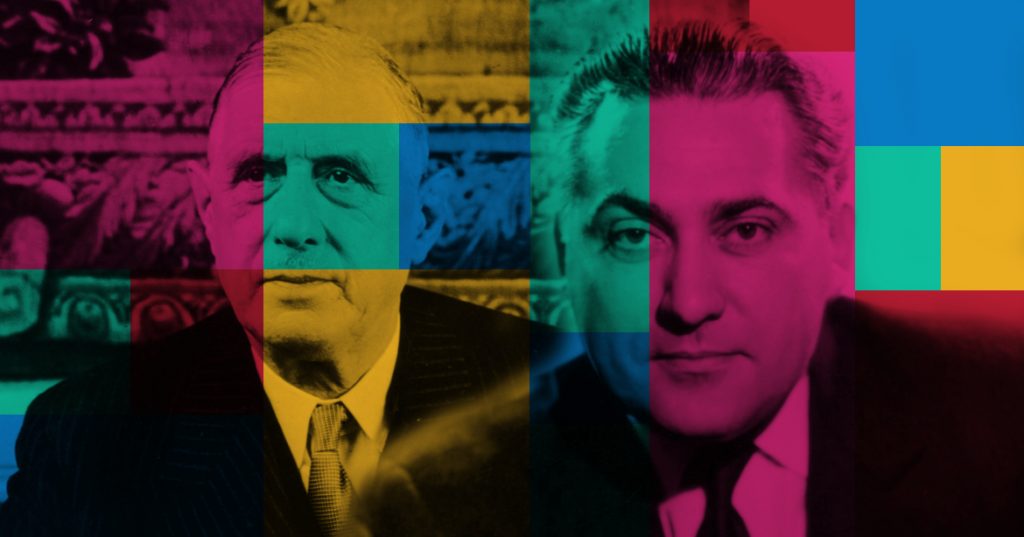A look at this business of a man’s right to speak on the box
Milton Shulman predicts a riot

MANY OF our politicians are so dedicated to the Parliamentary institutions in which they function and are so involved in their workings that they are oblivious to the waves of change and thought that are already eroding and undermining these institutions.
Anyone who watched Mr. Quintin Hogg on Panorama last week would have seen how fiercely and how pugnaciously a responsible politician reacts to any threats to conventional political attitudes.
Mr. Hogg lost his temper with Mr. Perry Anderson, a research fellow at Reading University and editor of the New Left Review.
★
Mr. Anderson, speaking in the low-keyed, rational tones of this kind of TV discussion (which was on the problems of Parliamentary democracy), was saying that talk of referenda or administrative devolution “is so much irrelevancy, it means nothing to the major part of the population in this country.”
A harmless enough comment. you might think. Not one to set pulses racing or fists pounding. But it sent Mr. Hogg into a lather of agitation which, by comparison, made most Frenchmen I had seen on telly seem like models of calm imperturbability.
“What right have you to speak for the major part of the population?” shouted Mr. Hogg. “You represent nobody. Nobody would v ote for you if you stood for Parliament. You ignorant man, why do you claim to speak for the major part of the population of this country?”
★
Now you will notice that what roused Mr. Hogg’s abuse was that Mr. Anderson, who is not an MP, should claim to speak for “the major part” of this country.
Presumably if he had been an MP, Mr. Hogg would have granted him this privilege. Or if he had been head of the TUC, like Mr. George Woodcock, he would have had the right to speak for a major or minor part of this country. Mr. Hogg clearly has no doubts that he has the right to speak for “the major part” of this country.
Now it seemed not to have occurred to Mr. Hogg that the reason he was in the Panorama studio discussing the possibility of bloodshed in Britain was because a young student named Daniel Cohn-Bendit, who “represented nobody,” took a handful of students to the barricades to protest against educational and social conditions.
It is this conflict between those who believe that an ordered society can only function through elected representatives of the people and those who feel that the Parliamentary machine is too remote, too inflexible, too cumbersome, too self-infatuated, too indifferent to minority protests that is at the heart of the present malaise in all democratic societies.
The word that has dominated the speeches and the conversation of those involved in the current turmoil in France has been “participation.”
★
It was this frustration at not being allowed to actively participate in the direction of their own affairs, at being well-looked-after pawns in a benevolent autocracy, that united French students, workers and intellectuals. Economics, it should be noted, was only a secondary aspect of the revolt.
Now what guarantees are there that this feeling of non-participation, which can fortuitously be ignited into violent resentment, does not exist among the British people?
The truth is that our Parliamentary system has evolved to a point where we elect, for all practical purposes, an administrative dictatorship for a maximum of five years.
★
The Labour Party showed how it was possible to remain in power with a tiny majority of three. We have seen how little influence the protests of backbenchers, the Opposition or the House of Lords can have on a Government determined to push through any sort of legislation it desires.
The most effective pressures on Government action do not come from within the Parliamentary system, but from outside it. From the Press, television and public demonstrations.
Now it is interesting that in de Gaulle’s France the most obvious repression was exercised over TV. “They (the opposition) have the Press,” said de Gaulle. “I have the RTF and I intend to keep it.”
★
But the mere act of using TV as an instrument of Government policy, of denying it the right to act as a channel for protest and opposition, is, in my opinion, one of the major causes of France’s present turmoil.
In highly industrialised societies like France and Britain, viewers are sensitive enough to realise when the total picture of their life, as shown on TV, is a lying or evasive one.
When Mr. Edward Short, as Postmaster-General, a few months back, said: “We do not want TV to degenerate into the state in which the British Press finds itself to-day,” was he not saying something similar to de Gaulle’s dictum: “They have the Press. I have the RTF, and I intend to keep it.”
★
No one suggests that Mr. Wilson’s Government is exercising a de Gaullist censorship over TV. Bid there are subtler and less obvious ways of making sure that TV does not function as vigorously or effectively as it should as a channel of protest and public participation.
The appointment of two politicians as heads of the BBC and ITV makes sure that Parliamentary sensitivities and sensibilities will always be recognised and appreciated in the highest quarters.
If minorities cannot acquire a reasonable access to the TV medium; if governments cannot encourage the use of TV as a safety-valve for dissipating and cooling the heated discontents of our time; then do not be surprised if frustrated Britons also take to the streets and the barricades.



